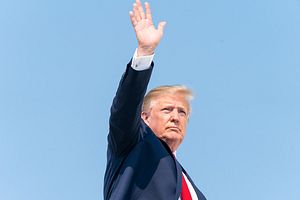The start of the primary process to identify the Democratic Party nominee for U.S. president doesn’t only concern the United States. The consequences of U.S presidential elections are such that the race to secure a party nomination is a global event. In Australia, the process is followed very closely, with this week’s Iowa caucus (and its mishaps) being the leading items on a number of news bulletins.
Whoever holds the U.S presidency has a considerable impact not just on Australia’s foreign affairs, but also on the domestic political culture, as ideological norms established in the United States have a tendency to resonate out to other Western states. The forthcoming presidential election may be especially influential.
As with most of America’s allies, the Trump presidency has elicited a substantial amount of anxiety in Canberra. Of course, the Australian government would never indicate a preference for any presidential candidate, yet it is clearly in the country’s interest for some resemblance of normalcy to return to the behavior of the United States. It is unlikely that a second Trump term would produce this result.
Of America’s allies, Australia has arguably been the least affected by Trump’s corrosive presidency. Aside from an initial terse phone call with then-Prime Minister Malcolm Turnbull — due to Trump not wanting to honor a deal Australia had made with President Barack Obama on refugee resettlement — Australia has avoided Trump’s suspicions and ire. This has mostly been due to staying below Trump’s radar. Australia may often feel overlooked by the rest of the world, but Canberra quickly discovered this is an advantage when it comes to Trump. If he’s thinking about you, then it is highly likely trouble is coming your way. Yet this is far from an ideal way to approach the relationship with your closest ally and primary security partner.
If there is one constant of the Trump presidency, it is that he doesn’t like the idea of allies. He is transactional in nature and sees the mutual obligations of alliances as a burden. The reality and rationale of having allies is lost on Trump. The United States may be the most powerful country in the world, but this power is supported and consolidated by its network of alliances. These alliances are an advantage that an emerging great power like China cannot match. To weaken these alliances is to diminish American strength.
This is problematic for a country like Australia, whose security perspective and operations are so wedded to the United States. Yet Trump’s wider unpredictability is also deeply confrontational to Canberra. It is the responsibility of superpowers to be predictable. When the United States moves, all other countries adjust accordingly. Until Trump, U.S. presidents have had the respect for their allies to act in a manner that allowed partners to adjust with relative certainty. Trump, however, has displayed no such predictability and respect. He is naturally an agent of chaos. This is a strategy he uses to try and disarm others (particularly those more well-informed than himself) and a symptom of his uniquely turbulent personality.
It is the predictability of U.S. action that Australia would hope to see restored. For Canberra, any of the candidates running for the Democratic Party presidential nominee offer this restoration. But beyond respect and predictability, the current Democratic candidates can offer Australia another very simple thing: relief. Relief that Canberra no longer has to tip-toe around its primary ally; relief that the prime minister can once again have a rational and frank conversation with the president of the United States without fear of igniting a Twitter tantrum; relief that there is a president who will act in good faith and not be driven by obtaining personal leverage; relief that there is someone occupying the White House who has a larger understanding of the world outside of their own blinkered personal interest; and relief that some greater integrity and coherence can be restored to the world’s most powerful nation.
Of the current Democratic field, the isolationist tendencies of Senator Bernie Sanders may be a concern for Australia, with its strong interest in keeping the United States actively engaged in Asia. However, it is more than likely that Sanders isn’t the radical actor his most fervent supporters believe him to be (or have projected onto him). His decisions — should he become president — will be guided by the expertise that is presented to him, and his demeanor will probably be more sympathetic to U.S. allies. His desire to disengage from the Middle East may be a problem for Australia given its reliance on consistent energy flows from the region. Or it may force Australia to reorganize its weak approach to energy security.
The simple desires for predictability and integrity may seem like unspecific hopes for Australia’s relations with the United States going forward, but when these are absent in a state’s leadership, the institutional decay can quickly metastasize and consume all state actions. As Australia observes the Democratic primary process, it will be looking for a political actor who will place paramount importance on their own personal conduct as a representation of Washington’s. Australia will also be watching to see whether in his first term Trump has altered the United States beyond what can be repaired, and what the country might become if he gets a second.

































